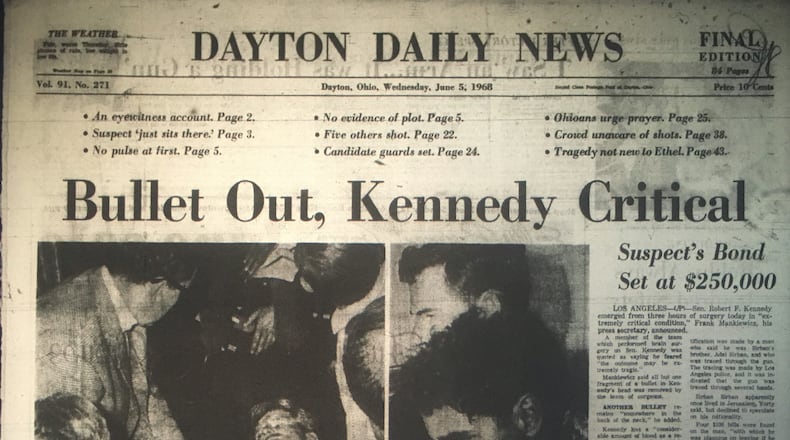“At Meadowdale High School, the usual last-day-of-school exuberance was replaced by unnatural quiet,” Geringer reported. “Students were allowed to listen to their transistor radios for the latest news.”
On the streets of Dayton, a lot of people talked about conspiracy theories just like they do today, 50 years later.
“John Kennedy, Martin Luther King and now Bobby Kennedy,” puzzled George Martin. “It’s something more than isolated incidents,” he said. “The government is shaky now, very shaky.”
Elaine Rogers and Rita Gurth were Bible students distributing literature downtown when they heard the news they said it was a sign of lawlessness foretold in the Bible.
“God is well aware of the situation,” Rogers said.
Ann Hammond, a bakery employee at the Arcade shook her head when asked about the shooting.
“All I can think about is him,” she said.
Geneva Simpson, who was waiting on a bus downtown, said “they just don’t want him to be president.”
In a debate that could be right out of today’s headlines, Pastor Al Denman at Antioch College said “we can no longer afford the luxury of allowing disturbed people to carry guns. We must amend the Constitution on the right to bear arms.”
Kennedy had just won the California Democratic primary before he was shot in Los Angeles. He lived slightly more than a day before dying on June 6.
The Church Federation of Greater Dayton asked all member churches to share in a national day of mourning on the Sunday following Kennedy’s death.
The Archdiocese of Cincinnati requested Roman Catholic priests to use the Prayer of the Faithful in their Sunday sermons.
Morning masses at the University of Dayton were dedicated to Kennedy.
In a June 6 editorial in the Dayton Daily News, the paper said “He passionately believed in this country. He grieved when he saw it shunning its best nature, saw it getting uppity at the legitimate demands of its needy and going callous toward people abroad. Sen. Kennedy dedicated and finally gave his life in the service of the people with whom he shared a nation and a dream.”
Kennedy was in Columbus about a month before his death
Kennedy swung through Columbus on May 13-14, 1968 just weeks before his death.
A few weeks before his May 1968 stop in Columbus, Kennedy had the task of announcing Martin Luther King’s assassination to a duly shocked and horrified crowd in Indianapolis.
Former Ohio Gov. John Gilligan, who was running for the Senate back then, campaigned with Kennedy in 1968 and said “I never saw anyone who was generating the kind of excitement as he was at that time,”
Kennedy had come to Columbus to meet with Ohio delegates before the Democratic convention in Chicago where he was in a fight with then Vice President Hubert Humphrey.
Kennedy and his wife Ethel rode in a convertible from the airport through the city. Kennedy got out of the car in one neighborhood and shook hands with onlookers.
In 1966, Kennedy visited Cincinnati to campaign for Gilligan who at the time was running for re-election to Congress.
About the Author
